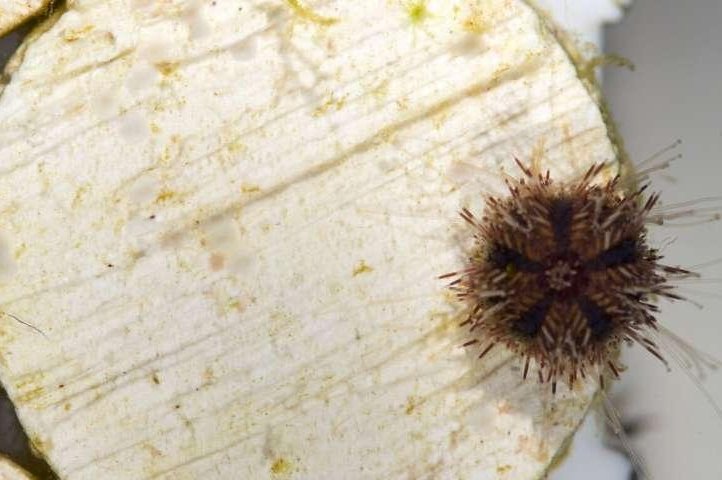Lab-spawned corals raised alongside juvenile sea urchins were more likely to be alive after six months than corals raised alone. Photo by University of Derby
Sept. 11 (UPI) -- When paired with sea urchins, lab-grown corals are more likely to survive, according to a new study. The research could boost coral reef restoration efforts.
Algae are essential to coral. The algae, or phytoplankton, get shelter from coral. In return, the algae provide some of the energy harvested from sunlight via photosynthesis.
But there is such a thing as too much of a good thing. Coral can become overwhelmed by a proliferation of algae. Sea urchins eat algae, and on coral reefs, they help keep the algae population at healthy levels.
However, adult sea urchins eat young corals. Ecosystems are a complex balancing act. Luckily for the young corals being raised in the research labs at Horniman Aquarium in London, researchers paired them with juvenile urchins. The urchins helped control algae growth but didn't threaten the baby coral.
Scientists placed different numbers of sea urchins in separate tanks with hundreds of baby corals. In the tank without any Tuxedo urchins, only 5 percent of the baby broadcast corals survived for six months. In the tank with the most urchins -- 18 urchins reared alongside 1,250 corals
-- 40 percent of the corals survived.
Coral reefs around the world have been severely degraded by global warming and pollution. Conservationists have tried to develop strategies for restoring damaged reefs. The latest research could aid such efforts.
"This research is an important next step for Project Coral, our international research partnership which has already broken the code to allow predictable spawning of corals in laboratory settings. Low survival rates of juvenile corals are currently a barrier to effective reef restoration," Jamie Craggs, lead researcher and curator at the Horniman Aquarium, said in a news release. "This new co-culturing technique using sea urchins makes possible a major up-scaling in the number of corals that could be reared and transplanted onto damaged reefs, and we're already getting interest from leading reef restoration organizations around the world."
Scientists have previously reared corals and snails side-by-side, but co-culturing with urchins was new. Researchers published the results of their efforts this week in the journal Scientific Reports.
"This research has overcome significant challenges in terms of logistics and husbandry, to rear sea urchins to exactly the right size to graze without damaging the juvenile corals, allowing them to thrive," said Michael Sweet, an associate professor in aquatic biology at the University of Derby. "In addition we highlight one possible way in which reef restoration can be self- funded, by co-culturing a commercially important species and using the profits to funnel back into methods to try and save our reefs."















